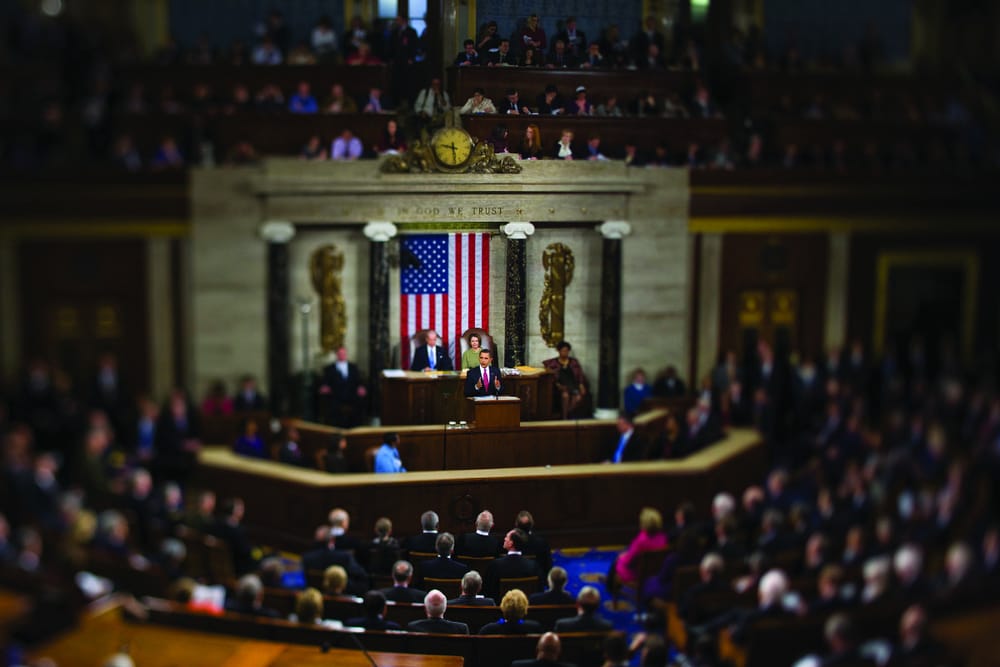Science is fighting to survive in washington
Nils Hanwahr examines Obama’s plan for the future of science in the United States

In his recent State of the Union address, President Obama said: “This is our generation’s Sputnik moment.” Invoking the Space Race of the 1960s, he called for an unprecedented level of research and development, especially in biomedical and clean energy technology. At that time, the 2011 budget still had not been passed – and what is today’s Sputnik supposed to be, anyway? Obama said that funding science is “an investment that will strengthen our security, protect our planet, and create countless new jobs for our people.” The image of the space race thus paints a picture of science as the motor of the economic power of the United States and the American people. Why the Sputnik shock? Why not mention the great achievement of the first astronauts looking back at the earth, making us realize that we share a common responsibility for the planet?
Obama’s science advisor John Holdren started out in 2008 with an ambitious agenda to increase science funding, develop a comprehensive strategy to lower carbon emissions, and support biomedical research, especially concerning bioterrorism. The main difference to the Bush administration was to recognize climate change as a global problem and pledge to lower carbon emissions. However, after the disappointing outcome of Copenhagen and the hazing of the new healthcare law, the Obama administration appears to have lost sight of its grand plans. There are currently no comprehensive initiatives on the way to match the goal of providing 80 percent of US energy from clean sources by 2035, and while a State of the Union address is always a good occasion to announce ambitious goals, getting there will be a rocky road.
The Republican Party took over the House of Representatives in last autumn’s midterm elections. This new distribution of power will affect vital science issues such as global warming and energy policy, as well as basic research funding in the US. Regarding the Republicans’ pledge to return government spending to the levels of 2008, many scientists fear a funding squeeze for research in the United States. While the 2011 budget is still under debate in the House, large funding bodies such as the National Institute of Health, the National Science Foundation, and even NASA faced a freezing of their budget and a future that is increasingly hard to fathom. Republicans, especially during the Bush years, have gained an image of being restrictive with respect to science and research, as, for example, the journalist Chris Mooney in his 2005 book The Republican War on Science argues. Nevertheless, the fronts in the quarrel about science funding are not as clearly drawn as we tend to think.
Just before Christmas in 2010, the new House Committee for Science and Technology under Republican chairman Ralph Hall, a lawyer from Texas with no experience in science, helped to pass the America COMPETES Act, extending programs to improve basic research and science education – a result that left pessimistic scientists pleasantly surprised. His Republican colleague Vernon Ehlers from Michigan states that it was important not to abandon scientists, who contribute crucially to manufacturing in America.
On the other hand, the scientific public was left stunned when John Shimkus, the new Republican chair of the House committee on the economy and the environment, denied the severity of climate change in November 2010 by quoting scripture to argue that God would not destroy the world through global warming. Thus, the Republican Party appears divided between the traditional American trust in progress, science, and technology and the Tea Party’s zeal to cut government spending.
Were funding levels really returned to the levels of 2008, an analysis by the AAAS (American Association of Science) concludes, the average cut for scientific bodies would be 7 percent in comparison to 2010. Funding for the military will not be affected by the cuts, since cutbacks in military spending could easily be seen as putting the lives of American soldiers in danger. Yet, this also points us to another problem with Obama’s Sputnik reference. The surge of investment into US science after World War II was intricately related to security concerns and potential military threats. After 9/11, the relationship of technology and science to national security has changed. Units to counter cyber attacks and bioterrorism are now on the agenda, and yet, many Americans today regard economic crisis and bankruptcy as similarly frightening threats. That is why science and research now have to justify their actions in terms of economic pay-off. Simply put, Sputnik was a satellite, and neither terrorism nor the financial crisis can be reduced to a shiny metal probe zooming around the earth emitting radio signals.
The State of the Union supposes a linear relationship between scientific research, innovation and job creation. The Science is Vital campaign in the UK took a similar approach, arguing that funding cuts will hurt the country economically. Obama also sees research as an innovation engine, saying, “Cutting the deficit by gutting our investments in innovation and education is like lightening an overloaded airplane by removing its engine. It may make you feel like you’re flying high at first, but it won’t take long before you feel the impact.” Speaking in general terms about science as creating jobs is rather uncontroversial, yet specific issues are subject to substantial disagreements about values. Last year, an initiative by the Administration to permit federal funding of embryonic stem-cell research was unsuccessful even before Republicans took over Congress. A cap-and-trade bill for carbon emissions failed to pass the Senate. And Obama himself runs risk of failing to overcome this division by justifying science in terms of economic prospects instead of addressing the underlying values of debates about biotech and climate change.
Invoking a ‘Sputnik moment’ was a call for a bipartisan push to get the US out of the economic slump by out-innovating competitors. However, science is not just about racing the Soviets anymore, there are bigger questions to consider, especially the tough calls of reconciling a clean energy future with the American lifestyle of economic prosperity. The Republican victory in the midterms will make Obama’s job all the more harder.








